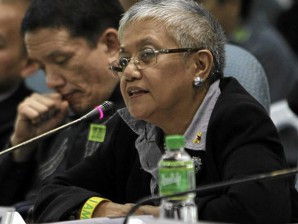
Sec. Teresita Deles. INQUIRER file photo
DAVAO CITY, Philippines—Presidential peace adviser Teresita Deles gave high marks to the government’s anti-insurgency campaign, now called Oplan Bayanihan.
Deles told reporters here Friday that she has received “good feedback on the ground” about Oplan Bayanihan, especially because of the projects the soldiers were helping implement.
She said the role of soldiers in the communities has “changed” and, unlike before, they are no longer feared by villagers.
“At least, this is no longer the usual approach, where soldiers were only involved in combat operations. This time, they get to deliver services to the communities. The communities have learned to accept that,” Deles said.
Told that some communities in Compostela Valley and Davao Oriental have been complaining about soldiers setting up camp in civilian areas and using schools and barangay halls as headquarters, Deles quickly answered, “It is not allowed.”
“The AFP knows that it is not allowed. To do so will violate the United Nations human rights convention,” she said.
Deles said there was no excuse for occupying schools and barangay halls even if the soldiers were invited to the area by the local government.
“They should find other places far from civilian communities so that civilians will not be caught in the crossfire,” she said. “As a signatory (to the UN Conventions), we are being watched.”
The human rights group Karapatan and the interfaith group Exodus for Justice and Peace have charged that that troops belonging to the 701st Infantry Brigade have been harassing civilians in the towns of Banaybanay, Lupon, Mati and San Isidro in Davao Oriental.
Soldiers have been conducting a census in the barangays, questioning residents about their membership or participation in progressive organizations, a type of questioning that made villagers feel harassed, intimidated and threatened, said the Rev. Jurie Jaime, spokesperson of Karapatan in Southern Mindanao.
In Sitio Logdeck, in the town of Lupon, residents and leaders of peasant groups were afraid of going out of their homes for fear the soldiers would brand them as members of the NPA, he said.
“They are no longer able to attend to their farms and livestock. They sleep under the beds. They don’t go to town. Once they got to leave secretly, they never return to their communities,” Jaime said.
Lieutenant Colonel Lyndon Paniza, spokesperson of the 10th Infantry Division, which operates in the province, said these were accusations based on “mere hearsay and maliciously fabricated to mar the image of the Philippine Army.”
“There was no harassment and we respect all forms of rights,” he said.
Deles said if there are complaints of human rights violations, the military has an office where complaints can be lodged and investigated.
While the military was intensifying its anti-communist campaign by bringing development projects to communities, Deles said the government remains open to negotiations with the National Democratic Front.
“What we want is substantive talks without precondition,” she said.
Peace talks with the communist rebels and the government have stalled on the NDF’s insistence on the release of all political prisoners.